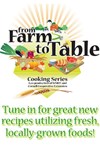Posted 2/26/2010
by Roseann Doran

The recent weather has left many in the area without power. The U.S. Department of Agriculture provides recommendations to those affected by severe winter to help minimize the potential for foodborne illnesses. “Without electricity or a cold source, foods stored in refrigerators and freezers can become unsafe. Bacteria in food grows rapidly at temperatures between 40 and 140 °F, and if these foods are consumed, people can become very sick,” the USDA warns.
The USDA recommends the following steps you should take if you’re left without electricity:
Posted 2/24/2010
by Roseann Doran
In its annual report, “Making Connections: Developing a Food System for a Healthier New York State” the New York State Council on Food Policy makes recommendations to improve access to healthy foods. They also highlight areas of progress made in 2009. CCEFM is proud to have played an active role in the ‘Family Meals Matter’ initiative, a consumer outreach project that emphasized the importance of family meals. Joining other Capital Region CCE’s and in partnership with Price Chopper Supermarkets, CCEFM helped to increase consumer awareness and knowledge about healthy eating, one of the four key issue areas.
The four key issue include the following:
- Maximizing Participation in Food and Nutrition Assistance Programs
- Strengthening the Connection between Local Food Products and Consumers
- Supporting Efficient and Profitable Agricultural Food Production and Retail Food Infrastructure
- Increasing Consumer Awareness and Knowledge about Healthy Eating; and Improving Consumer Access to Safe and Nutritious Food
Over the year, the 21-member advisory council shares networks and resources, builds and capitalizes on collaboration opportunities, researches relevant topics, communicates with stakeholders, and serves as a vehicle for the citizens of New York State to communicate food policy matters to the Governor. From those interactions, some of the significant steps the Council recommends New York State take in 2010 include:
1. Join the campaign to end Childhood Hunger by 2015
2. Support a strong Child Nutrition and Women, Infants and Children (WIC) Reauthorization Act
3. Maximize federal funding for nutrition and food programs operating in New York.
The Council also recommended twelve additional food policies that can be enacted to improve the health and prosperity of its citizens.
The New York State Council on Food Policy was created in 2007 with the recognition that in New York State, agriculture is a critically important industry; that hunger is a serious problem facing many families; that access to affordable, fresh and nutritious food is a serious problem, especially affecting children; and that there are significant environmental, health and economic benefits to the State and its residents from expanding agricultural production. At no time in recent history are these matters more prevalent in society than present.
For the full report and a summary of the ‘Family Meals Matter’ project visit the New York State Council on Food Policy at: http://www.nyscfp.org/reporttogov.html
To learn more about the Council on Food Policy, visit http://www.nyscfp.org or contact the New York State Department of Agriculture and Markets at 518-485-7728.
Posted 2/23/2010
by Roseann Doran

Sweet potatoes or yams: What’s in a name? Yams in the United States are actually sweet potatoes with moist texture, orange flesh, and a sweet flavor. Other varieties of sweet potatoes are smooth with skins that can vary in color, depending on the variety, from pale yellow to deep purple to vivid orange.
Did you know that sweet potatoes have four times the US Recommended Daily Allowance (USRDA) for beta-carotene when eaten with the skin on? They are a great source of vitamin E, and they are virtually fat free. Just two thirds of a cup of sweet potatoes provides 100% of the USRDA for Vitamin E, without the unwanted fat.
Posted 2/17/2010
by Marcia Wood
Pistachios, almonds and other popular tree nuts might someday be routinely sprayed with a yeast called Pichia anomala. Laboratory and field studies by Agricultural Research Service (ARS) plant physiologist Sui-Sheng (Sylvia) Hua have shown that the yeast competes successfully for nutrients—and space to grow—that might otherwise be used by an unwanted mold, Aspergillus flavus.
A. flavus and some other Aspergillus species can produce troublesome toxins known collectively as aflatoxins.
Posted 2/5/2010
by Karen Kosinski

Season two of this very popular half-hour television show has begun airing. From Farm to Table is a co-production of Cornell Cooperative Extension and WMHT Public Television station.
Posted 1/28/2010
by Karen Kosinski

November 9 and 16, 2010, 5:30-7:30 p.m.
It is projected that in thrity years, many more Americans will have Diabetes, perhaps as many as one in three people. Cooking for Diabetes is a two-session program that will provide practical, hands-on learning activities designed to help plan healthy snacks and meals for persons with Type II diabetes. Participants are expected to attend both sessions.
People who have been diagnosed with Diabetes, people who are living with persons with Diabetes and people who are cooking for people with Diabetes are encouraged to register and attend the two-part program.
Thanks to the sponsorship of Hero-BeechNut who has underwritten this program, both sessions are free to participants.
Both sessions will be held in CCEFM's Teaching Kitchen on the ground level at 55 East Main Street in Johnstown. Nutrition educators Roseann Doran and Eileen Lang will instruct.
Participants will be engaged in both classroom instruction and hands-on learning activities. Each household will receive a Diabetes cookbook and other hand-outs to aid in planning healthy meals at home.
Register early as this program is expected to fill up quickly. Call the CCEFM office at 518-762-3909 x 101 by November 8th. If you should need to cancel your registration at any time, it is essential that you call our office so that your space may be filled from a waiting list.
Posted 1/21/2010

Is losing weight or improving overall health one of your New Year's resolutions? Following a quick weight loss diet or cutting out meals will not help you achieve these goals. Good habits established at the beginning of the New Year will make the difference. Americans are still eating way too much fat, salt, and sugar. So why haven't we changed? One reason is that translating dietary recommendations into everyday meals is difficult with all the conflicting news reports about what we should eat.
Posted 1/20/2010

Many people eat because of stress, boredom, anger, loneliness, joy or as a reward. Often, they may not be aware that their eating is emotionally driven. Perhaps some of your hunger is actually emotional and not physical. It can be hard to tell the difference between the two.
Posted 1/19/2010

Larger portion sizes encourage people to eat and drink more – no matter how hungry we are. The more we are served, the more we eat. This leads to weight gain because people consume more calories than they need.
Posted 12/15/2009

Start with the newly revised Dietary Guidelines and go from there. Updated every five years, the current Dietary Guidelines for Americans were published in May, 2000. They emphasize balance, moderation and variety in food choices, with a special emphasis on grain products, vegetables and fruits. The new guidelines also emphasize physical activity as important for healthy living, more than just for weight management. For example, physical activity can help build and maintain healthy bones, muscles, and joints; build endurance and muscular strength; and promote psychological well-being and self-esteem.












